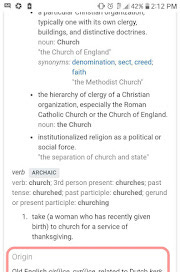It's bad enough that professing Hebrews make the false accusation of the word "Jesus" being pagan, but some also even claim that the word "Church" is also pagan. I know it sounds crazy but many of these claims come from Gnostics and esoteric new agers.
But we will see how this word is just as natural and transliterated directly from scripture. Circe is a greek word for "bird" or "hawk". The word for Church is ECCLESIA in Greek. The Oxford English Dictionary gives this etymology of the word "church":
"Middle English chirche, churche, chereche, etc., < Old English cir(i)ce, cyrice, cyric, (Northumbrian) circe, cyrce, cyric, < Late Latin cirica, circia, c(h)irica, < Greek κυριακόν (δωμα), the Lord's (house), < κυριακός, of or belonging to the Lord, < κύριος, lord."
In other words, the English word "church" comes from the Old English "cir(i)ce," which was derived from Late Latin "cirica" or "chirica," which in turn came from the Greek word "κυριακόν (δωμα)" meaning "the Lord's house" or "belonging to the Lord."
The google search for the origins of the word "church" mentions nothing of "circe" the greek goddess at all. Observe below:
Origin
Old English cir(i)ce, cyr(i)ce, related to Dutch kerk and German Kirche, based on medieval Greek kurikon, from Greek kuriakon (dōma) ‘Lord's (house)’, from kurios ‘master or lord’. Compare with kirk.
Church - Old English: circe etc. = Old Saxon: kirka. But that's just the english language. Greek is the true early root usage of this word. The origin of the word "church" is kuriakon or kyriakon in Greek. The meaning is a building (the house of Kurios, or Lord).
"Ku-ri-a-kos" is understood by its root: "Ku- ri-os," which means "lord." Thus, "kuriakos" (i.e., "church") means "pertaining to the lord." It refers to something that pertains to, or belongs to, a lord. The Greek "kuriakos" eventually came to be used in Old English form as "cirice" (Kee-ree-ke), then to "churche" (kerke), and eventually "church" in its traditional pronunciation. A church, then, is correctly that which "pertains to, or belongs to, a lord." And the Ecclesia most certainly pertains to The Lord.
The Greek word "kuriakos" appears in the New Testament only twice. It is found once in I Corinthians 11:20 where it refers to "the Lord's supper," and once again in Revelation 1:10 where it refers to "the Lord's day." In both of those cases, it is translated "the Lord's..." - not "church". Because the church was always a community of believers, not a building. The words ECCLESIA and KURIAKOS both refer to THE DWELLING PLACE OF GOD AND THE PEOPLE OF GOD. God dwells in holy places and people. That is the context and usage of these Greek words.
Also, the later word "cirke" means circle. That's it. The usage, NOT THE WORD, is God's concern. pagans worshipped false gods in that circle... Christians in Europe worshipped God in a building, a KURIAKOS, as an ECCLESIA. not a CIRCLE. James uses the word religion and redefined it against its own meaning.
James 1:27 - 27 Pure religion and undefiled before God and the Father is this, To visit the fatherless and widows in their affliction, and to keep himself unspotted from the world.
So religion according to James is, "visit the fatherless and widows in their affliction, and to keep himself unspotted from the world."
Religion according to the greek language is, "religious worship, especially external, that which consists in ceremonies" - Thayer's Greek Lexicon
Paul uses the phrase "Jesus is Lord" and redefined it against its own origin and context being "Caesar is lord". God used Circumcision to enter people into a covenant with him, despite pagans doing it first and assigning meaning to it first. According to some professing Hebrew logic, the methodology of their own beliefs would call God an heir of pagan practice, Paul a redefiner of Jesus being an emperor idol, and James a creator of his own religion by his usage of the word religion... But one would never say that.
Let us now examine The other LATIN word and definition for circa:
Approximately ( approximately , Latin: circa ) means about or approximately , which is used to denote uncertain or less important goals, such as dates or amounts. [1] The word comes from Latin circa [2] , which actually means "perimeter", which is also found in the word circumference . [3] To be a Latin word, which in addition has full good Norwegian synonyms , the use of the word approximately quite common in Norwegian vernacular. One can say, for example. say if the person is about 50 years old , or if more historical events are said to be The battle at Hafrsfjord stood at about 872 , often shortened , since this year is uncertain. Our final examination comes from a wiki Article for further proof via transliteration.
The word ekklesia and the word kuriakos was used to describe church in the new testament. So according to the article, the usage of the word ekklesia was used and retained by the latin language and all of it's derivative languages being french, Italian, spanish and Portuguese, and Celtic languages like Welsh, Irish, Breton, and Turkish.
Eglise, chiesa, iglesia, igreja, eglwys, eaglais, iliz, and kilise.
The Germanic, Slavic, old and middle English languages like Scottish, Russian and german adopted the other word used in the new testament for church, kuriakos and it's derivative words flowed from there.
Kirka, circe, kirche, kirk, tsertov, churche.
Wikipedia shows no historic usage of the greek goddess circe for the word church, but kuriakos instead... Just as etymology.com demonstrates as well. I pray this has given you much clarity. Ironically the term "Hebrew Israelite" is not found in scripture.
Christ is Risen





